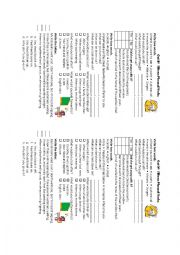
|
15 Phrasal Verbs
This worksheet provides practice for the 15 phrasal verbs introduced in the poster given at http://www.grammar.net/phrasalverbs
Level: intermediate
Age: 12-100
Type: worksheet
Downloads: 29
|
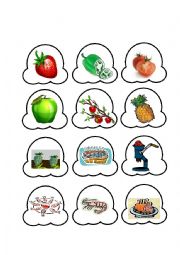
|
Popcount! (game) Game Card Sheet 2
Inspired by an alphabet game for preschool students, this game practices instead count and noncount nouns + food vocabulary. I made up this game to review the vocabulary given in Unit 12 of Cambridge�s Touchstone Level 1 materials. There are 6 sheets of game cards and a sheet with the correct number of logos (for pasting on the back of the cards).
Level: elementary
Age: 8-17
Type: activity-card
Downloads: 15
|
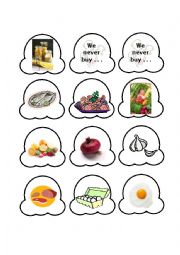
|
Popcount! (game) Game Card Sheet 5
Inspired by an alphabet game for preschool students, this game practices instead count and noncount nouns + food vocabulary. I made up this game to review the vocabulary given in Unit 12 of Cambridge�s Touchstone Level 1 materials. There are 6 sheets of game cards and a sheet with the correct number of logos (for pasting on the back of the cards).
Level: elementary
Age: 8-17
Type: activity-card
Downloads: 10
|
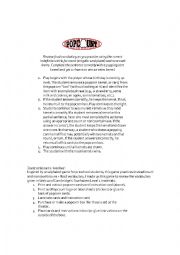
|
Popcount! (game) Instruction Card and Answers
Inspired by an alphabet game for preschool students, this game practices instead count and noncount nouns + food vocabulary. I made up this game to review the vocabulary given in Unit 12 of Cambridge�s Touchstone Level 1 materials. There are 6 sheets of game cards and a sheet with the correct number of logos (for pasting on the back of the cards).
Level: elementary
Age: 8-17
Type: activity-card
Downloads: 9
|
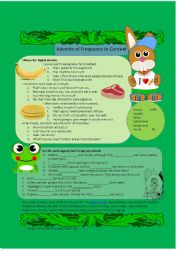
|
Adverbs of Frequency, Practice in Context
In the first exercise, students choose the most logical response based on the frequency adverb used in the sentence. In the second, students supply the appropriate frequency adverb based on the context supplied.
Level: elementary
Age: 12-100
Type: worksheet
Downloads: 40
|
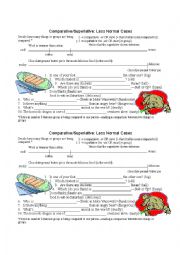
|
Comparative/Superlative--unusual cases
I noticed that my English textbook expected students to use the comparative and superlative in some unusual cases--with and without "than," with comparison of a group to one person, with -ly adjectives, and so on. So I developed this practice sheet to help students notice these unusual cases.
Answers: bigger, older/oldest (depends on the context)...
Level: elementary
Age: 11-17
Type: worksheet
Downloads: 58
|
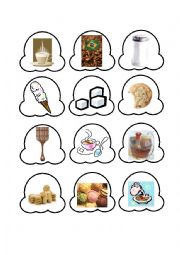
|
Popcount! (game) Game Card Sheet 3
Inspired by an alphabet game for preschool students, this game practices instead count and noncount nouns + food vocabulary. I made up this game to review the vocabulary given in Unit 12 of Cambridge�s Touchstone Level 1 materials. There are 6 sheets of game cards and a sheet with the correct number of logos (for pasting on the back of the cards).
Level: elementary
Age: 8-17
Type: activity-card
Downloads: 16
|
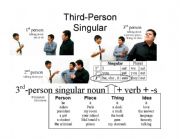
|
Third-Person Singular Poster
In addition to the traditional table showing the third-person singular change for the simple present tense, this poster gives examples of what types of nouns might take the place of "he/she/it" and illustrates the meaning of first-, second-, and third-person.
Level: elementary
Age: 8-17
Type: grammar-guide
Downloads: 10
|
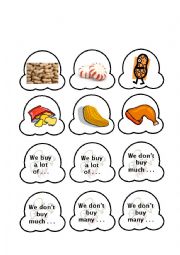
|
Popcount! (game) Game Card Sheet 4
Inspired by an alphabet game for preschool students, this game practices instead count and noncount nouns + food vocabulary. I made up this game to review the vocabulary given in Unit 12 of Cambridge�s Touchstone Level 1 materials. There are 6 sheets of game cards and a sheet with the correct number of logos (for pasting on the back of the cards).
Level: elementary
Age: 8-17
Type: activity-card
Downloads: 17
|
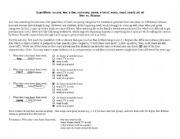
|
Quantifiers: Men vs. Women
This exercise provides options of things men and women might do in different circumstances, asking students to choose to describe either men or women and to add the quantifier: few, some, most, nearly all, etc. *It does not involve the concept count/noncount. With my class, I emphasized that a plural noun comes right after the quantifier.
Level: elementary
Age: 13-17
Type: worksheet
Downloads: 11
|